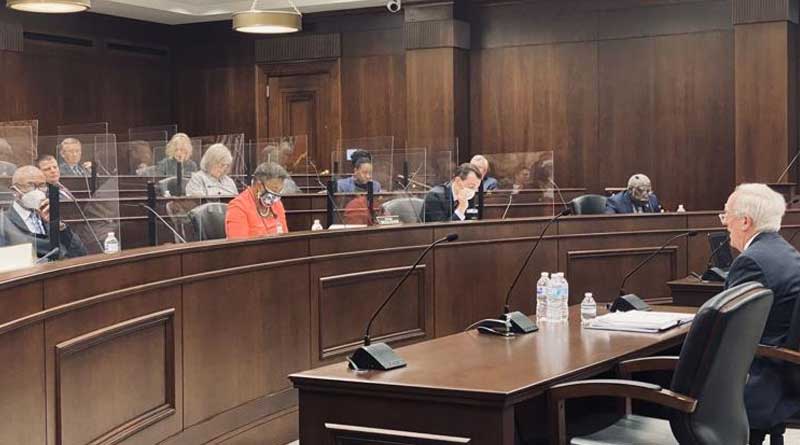Photo: Tennessee Attorney General Herbert Slatery testifies before a Joint Ad Hoc Study Committee on Executive Emergency Powers on Thursday, Sept. 3, 2020, at the Cordell Hull Legislative Office Building in Nashville, Tenn.
The Center Square [By Vivian Jones]-
Members of a legislative committee appointed to review emergency powers of the executive branch adopted recommendations Tuesday to limit the executive’s powers.
Lawmakers will consider bills based on the committee’s recommendations next year.
Tennessee has been under an unprecedented state of emergency because of the COVID-19 pandemic since March 12, and Gov. Bill Lee has said he will continue to extend the state’s emergency declaration as long as the national COVID-19 state of emergency is in effect.
House and Senate speakers appointed the committee in July to study existing executive powers during a state of emergency. Since then, the committee led by Sen. Ferrell Haile, R-Gallatin, and Rep. Jason Zachary, R-Knoxville, has met to hear testimony and discuss recommendations for bills to be considered by the Tennessee Legislature.
Tennessee’s executive branch has some of the most extensive emergency powers in the country, according to testimony heard by the committee. Existing state law does not provide for the Legislature to end a state of emergency, as in other states, and Tennessee has no time limit for how long a state of emergency can last.
Members of Lee’s executive team told the committee the governor’s “firmly held view” is that existing law on executive powers should not be changed. The governor’s office is aware of the committee’s recommendations and will give them due consideration, a spokesperson confirmed to The Center Square.
On Tuesday, committee members from the House and the Senate voted to adopt separate recommendations for legislative checks on executive emergency powers.
Recommendations adopted by committee members would only apply to health-related emergencies, such as the COVID-19 pandemic, not natural disasters or security-related emergencies.
House and Senate members recommend giving the Legislature power to end an executive state of emergency by adopting a resolution. Members also recommend requiring the governor’s office to provide notice to the Legislature or legislative leadership of any executive orders and their fiscal impacts before they are issued.
Both chambers’ recommendations agree there should be a time limit for how long an initial state of emergency declaration should last. House members recommend a state of emergency last no longer than 60 days without legislative approval, and Senate members recommend a limit of 100 days. Both agree the emergency status could be extended incrementally by the Legislature. If the Legislature is unable to agree, or unable to meet because of the emergency, the governor would have the power to extend the emergency.
House and Senate members differed on when the new restrictions on executive power should take effect. House members recommend the new rules become effective after the current COVID-19 state of emergency ends. The Senate recommended waiting until the next governor is elected, or at least until the end of Lee’s first term.
Recommendations agreed on by both chambers will be compiled into a bill Haile and Zachary will sponsor next year. Other recommendations without consensus will be considered in separate bills.
Lawmakers will return to Nashville on Jan. 12.



